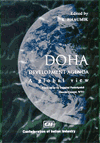| |
BOOK
REVIEW
WTO
fault Lines
Doha Development Agenda. A Global View.
T K Bhaumik (ed)
Reviewed by Chanakya Sen
The dismal failure of the World Trade
Organization's (WTO) Cancun ministerial in
September 2003 is a manifestation of the fault
lines in the entrails of the multilateral
trading system. This expansively edited book
features contributions from trade scholars and
practitioners and covers the whole shebang of
WTO deadlocks and polarizations that exploded
in Cancun. "There is a crisis. One can
solve a crisis only when it is
recognized." (p xxxii)
 The
Doha Development Round - initiated at the
fourth WTO Ministerial in Doha, Qatar in 2001
- is now almost certain to miss the January
2005 deadline for the "Single
Undertaking" concept, thus putting paid
to hopes of ambitious trade liberalization to
revive the world economy and lift millions out
of poverty. Doha is the first multilateral
trading round explicitly dubbed as the
"development round", an affirmation
that no other form of international economic
cooperation can offer developing countries the
gains that free trade can generate. However,
against the tide of development fanfare,
countries in the Organization for Economic
Cooperation and Development have backtracked
on special and differential treatment (SPD) as
well as implementation concerns. Whether the
global North is committed enough to convert
platitudes into reality is the anxiety of the
majority of WTO members. In industrialist
Rahul Bajaj's words, the "Marrakesh
spirit and basic principles behind the
establishment of WTO seem to have been
forgotten". (p 44) The
Doha Development Round - initiated at the
fourth WTO Ministerial in Doha, Qatar in 2001
- is now almost certain to miss the January
2005 deadline for the "Single
Undertaking" concept, thus putting paid
to hopes of ambitious trade liberalization to
revive the world economy and lift millions out
of poverty. Doha is the first multilateral
trading round explicitly dubbed as the
"development round", an affirmation
that no other form of international economic
cooperation can offer developing countries the
gains that free trade can generate. However,
against the tide of development fanfare,
countries in the Organization for Economic
Cooperation and Development have backtracked
on special and differential treatment (SPD) as
well as implementation concerns. Whether the
global North is committed enough to convert
platitudes into reality is the anxiety of the
majority of WTO members. In industrialist
Rahul Bajaj's words, the "Marrakesh
spirit and basic principles behind the
establishment of WTO seem to have been
forgotten". (p 44)
Indian Commerce Minister Arun Jaitley's essay
in the book calls for adequate windows of
exception for economies highly dependent on
agriculture and for speeding up the progress
of the Uruguay Round implementation - the
largest trade negotiation ever - while
questioning the peak and escalation tariffs of
developed countries. "Where market access
suits you, you go ahead with the sword. Yet,
when a country from the developing world has
the ability to penetrate your market you hold
up the shield and block access." (p 10)
But European Union Trade Commissioner Pascal
Lamy counters that SPD is "creating
second-class WTO citizens with diminished WTO
obligations but also diminished WTO
rights". (p 15) An EU business
representative proposes "graduation"
to determine which countries should benefit
from SPD and for how long, instead of blanket
amnesties and waivers that reduced developing
economies to bystanders in the General
Agreement on Tariffs and Trade era.
Cairns Group chairman Mark Vaile assails
domestic support in agriculture, saying it is
trade-distorting, and calls for its
progressive elimination as "a moral
obligation of the developing world". (p
21) He also cautions against the EU's
cumbersome idea of protecting geographical
indications, which, if extended beyond wines
and spirits, entails costly registration
systems for developing countries. Economist
Jagdish Bhagwati, meanwhile, has lambasted
legally complex, costly and rigid standards as
"backdoor intrusionism" to realize
the protectionist aims of developed states. By
the reckoning of many, standard harmonization
is the most insidious force inside the WTO.
New Zealand's trade minister, Jim Sutton,
makes the significant point that border
protection and subsidization in textiles,
footwear and agriculture are also present in
developing country markets, attenuating
South-South trade. Forty-five percent of
developing country trade flows are South-South
and 70 percent of the tariffs paid by
developing countries are to other developing
countries. It is essential for developing
countries to liberalize trade among
themselves, he says.
Razeen Sally, professor at the London School
of Economics, gives a heuristic account in
which he laments the Gadarene rush to regional
trading agreements since the debacle of
Seattle in 1999. The WTO is "in serious
danger of becoming marginalized by spider webs
of discriminatory trading arrangements".
(p 58) Creeping legalism in the organization
opens vistas for judicial activism powered by
rich member states able to afford armies of
high-fee boffins, he states, adding that if
developed countries do not live up to their
commitments to phase out bilateral quotas on
textiles and clothing by the 2005 deadline,
more storms will brew. EU enlargement and the
decision to expand the scope of textile quota
restrictions from May 2004 is a retrogressive
step, stated Sally. Tariffs on main textile
and clothing products remain at 12 percent in
the EU and 25 percent in the US.
Niggardly technical assistance from developed
country coffers and disguised restrictions on
trade through the EU's environment trump card
are other trouble spots addressed in the Doha
Development Agenda. There is currently no
obligation to part with a particular amount
for helping poor countries to implement WTO
agreements. Mandatory "eco-labels"
based on a life-cycle approach could erode the
competitive advantage of developing countries.
Trade retaliatory "environmental
imperialism" sets dangerous precedents.
Academic William Antholis remarks on the irony
that the workers and farmers most in need of
assistance globally are not industrialized
labor unions, Japanese rice farmers or French
organic farmers on the streets of Seattle, but
rather textile workers and subsistence farmers
in developing nations. "Industrialized
nations use their activist groups as a green
screen for protectionist tendencies". (p
156) Developing countries perceive many
western non-governmental organizations as
fronts for business interests from the
industrial north. The WTO must beware of
protectionists seeking to disguise special
interest agendas in the cloak of public
values, says Antholis.
Loopholes in the Agreement on Agriculture (AOA)
and its lopsided implementation are touched on
by Amir Ullah Khan. Japan, the EU and the US
have cut down low tariffs more than high
tariffs. Steeper reductions of high rates by
the developed world are vital. Under the AOA,
export subsidy commitments are problematically
viewed at aggregated levels, allowing
developed countries flexibility to maintain
and even increase subsidies at finer levels of
disaggregation.
Bioethicist Vandana Shiva considers the
conflict between the TRIPS (trade-related
aspects of intellectual property rights)
agreement and the Convention on Biological
Diversity. Western-style patent systems sap
the centuries-old practice of sharing
biological heritage to reap equitable
benefits. TRIPS also does not impose any
obligations on the owners of patents to
undertake technology transfer in the country
granting them the rights.
Consultant Julian Arkell calls for specific
commitments under the General Agreement on
Trade in Services (GATS) by advanced countries
to help strengthen the domestic services of
developing countries through access to
technology and distribution channels.
Ministries of immigration and labor in the
North are undermining GATS Mode 4 on the
movement of natural persons through the
arbitrary protection of borders and
discriminatory exclusion. Quad countries have
given no indication of wanting to address
temporary entry for semi-skilled and unskilled
workers. Until now, GATS has recorded a 0
percent unrestricted commitment in Mode 4. The
few horizontal commitments are biased towards
movement of executives, managers and
intra-corporate transferees.
Economist Nagesh Kumar vets the contentious
"Singapore Issue" of trade and
investment and the proposed Multilateral
Framework on Investment (MFI). "A
one-size-fits-all approach to FDI [foreign
direct investment] policy that is sought to be
evolved through the MFI in WTO cannot serve
the interests of countries at different levels
of development." (p 396) Only the rights
of investors are being protected in the MFI,
without concomitant obligations and
responsibilities to host country interests.
Developing countries should never forfeit
litheness to impose performance requirements
on foreign investors in tune with public
policy objectives.
Lobbyist Peter Wilmott studies the more benign
Singapore issue of trade facilitation, which
rationalizes that the processes and spreading
of best practices to mitigate border
bottlenecks can accrue benefits in a very
large measure to developing countries. The
incremental gain of smoothening procedures at
the entry and exit points of goods is going to
be proportionately less for industrialized
economies, says Wilmott. Unlike other WTO
topics, trade facilitation is a win-win
experience rather than one of trade-offs and
concessions. It reduces invisible costs and is
in the interest of the overall growth of
international trade.
Maurice Schiff of the World Bank takes up the
Doha mandate of examining the trade options of
small developing economies. South-South
Regional Integration Agreements (RIAs) tend to
benefit larger and more developed members
relative to smaller and poorer members, a
phenomenon labelled as "dynamic
divergence". North-South RIAs are likely
to be superior to South-South RIAs, but only
if small economies don't put all their eggs in
one basket and liberalize trade with the rest
of the world while being locked into Free
Trade Areas with the EU or the US. Further
integration into the multilateral trading
system and unilateral trade liberalization are
the optimal solutions for small economies to
survive the big bad world of preferential
trading agreements, says Schiff.
Readers searching for detailed exegeses on the
various stumbling problems confronting the WTO
should get a copy of this volume, whose
overriding concern is to make the Doha
Development Round a success. As one
contributor, Fred Smith of the US Enterprise
Institute, avers, "Collapse at Cancun may
be the best outcome if it leads to a
revitalized and more politically effective
free trade strategy." (p 194) If some of
the outstanding fissures raised in this book
are addressed conscientiously, the WTO and the
global economy, which are on life support
devices at present, can get up and start
walking hale and hearty again.
Doha Development Agenda. A Global View.
T K Bhaumik(ed), Penguin Books India, New
Delhi, 2003. ISBN: 0-67-004999-9. Price
US$19.80, 496 pages.
(Copyright 2004 Asia Times Online Ltd. All
rights reserved. Please contact [email protected]
for information on our sales and syndication
policies.) |
| |
|
|
 |
|




 The
Doha Development Round - initiated at the
fourth WTO Ministerial in Doha, Qatar in 2001
- is now almost certain to miss the January
2005 deadline for the "Single
Undertaking" concept, thus putting paid
to hopes of ambitious trade liberalization to
revive the world economy and lift millions out
of poverty. Doha is the first multilateral
trading round explicitly dubbed as the
"development round", an affirmation
that no other form of international economic
cooperation can offer developing countries the
gains that free trade can generate. However,
against the tide of development fanfare,
countries in the Organization for Economic
Cooperation and Development have backtracked
on special and differential treatment (SPD) as
well as implementation concerns. Whether the
global North is committed enough to convert
platitudes into reality is the anxiety of the
majority of WTO members. In industrialist
Rahul Bajaj's words, the "Marrakesh
spirit and basic principles behind the
establishment of WTO seem to have been
forgotten". (p 44)
The
Doha Development Round - initiated at the
fourth WTO Ministerial in Doha, Qatar in 2001
- is now almost certain to miss the January
2005 deadline for the "Single
Undertaking" concept, thus putting paid
to hopes of ambitious trade liberalization to
revive the world economy and lift millions out
of poverty. Doha is the first multilateral
trading round explicitly dubbed as the
"development round", an affirmation
that no other form of international economic
cooperation can offer developing countries the
gains that free trade can generate. However,
against the tide of development fanfare,
countries in the Organization for Economic
Cooperation and Development have backtracked
on special and differential treatment (SPD) as
well as implementation concerns. Whether the
global North is committed enough to convert
platitudes into reality is the anxiety of the
majority of WTO members. In industrialist
Rahul Bajaj's words, the "Marrakesh
spirit and basic principles behind the
establishment of WTO seem to have been
forgotten". (p 44)
